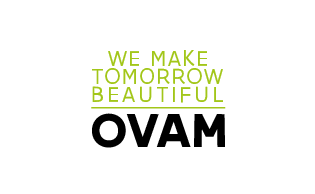CE Center closing event: Circular economy policy enhanced with data
Friday 10 December 2021
The current CE Center (2017-2021, also known as the Circular Economy Policy Research Center) went out with a bang at the end of November. During a much enjoyed closing event in Leuven, they presented the result of 5 years of research and launched the online monitor for the circular economy in Flanders. In the room: a very limited audience due to the current circumstances. At a safe distance: several hundred participants who followed the livestream from home. On stage: a group of fascinating speakers whose contributions you will find here.
The morning started a bit quieter than planned. Due to the worsening corona numbers and stricter measures, the podium debate with Flemish ministers Crevits and Demir was cancelled. So we didn’t get to see a live debate, but we did see two video messages. In them, the ministers underlined the importance of and their commitment to a circular economy.
Importance of an evidence-based policy
Minister Hilde Crevits put the government’s innovation policy, amongst other things, in the spotlight and indicated how important policy-relevant research is for this: ‘As a Flemish government, we invest 120 million euros in circular innovations and in our partnership with Circular Flanders. To know whether these efforts and investments are paying off, we need to be able to monitor everything properly. Knowledge is power.’
Minister Zuhal Demir also emphasised the importance of monitoring in her message: ‘Thanks to all the data that is collected, we can learn how to improve the way we recycle and reuse materials. And that’s good news for our climate.’
Limit material flows
Then the floor was given to Luc Alaerts, manager of the CE Center (download presentation). Using a diagram, he provided an overview of the material flows in the Flemish economy. He shed light on the enormous material consumption of a person in Flanders (20 tonnes/year) and the environmental impact this has. This is why the Flemish government has expressed its ambition to reduce consumption by 30% by 2030. It will be quite a challenge, Alaerts emphasised, because the number is currently increasing year on year. It is clear that we need to quickly take some major steps to transition to a circular economy.
We are very aware that policy can play a decisive role in this. Luc Alaerts: ‘In recent years, Flemish policy has focused on the sorted collection of waste and the development of the recycling industry. And successfully so. We’re seeing positive numbers there. But a circular economy is about much more than just recycling. It is also about reuse, extending lifespan through maintenance and repair, as-a-service models, …’
With the new monitor, which Alaerts presented extensively, the CE Center aims to provide all stakeholders with as much data as possible in order to accelerate and strengthen the transition to a circular economy.
‘The monitor is not just relevant for policymakers, it is also a guideline for entrepreneurs. The data and analysis provide them with insights into where we stand today and where the opportunities lie to contribute to the circular economy. The bar has been set high. Because circular products and services must be of better quality and have a lower footprint than those from the linear economy. This means innovations and creative entrepreneurship are needed.’
- Paul De Bruycker, chairman of Circular Flanders
About climate goals, green public procurement and hand blenders
The European view on the need for a circular economy was presented by none other than Prof. Hans Bruyninckx, head of the European Environment Agency (download presentatie). ‘We’re no longer talking in terms of urgency but of emergency,’ he said, setting the tone. This was followed by a compelling case for accelerating and scaling circular solutions and he emphasised the overwhelming responsibility that policy and industry have in this area. During his presentation, he also made it clear how wide-reaching the challenge is: ‘It’s not just about “reducing the tonnes of material”. It’s about offering products that have less impact on the environment, the climate and our health.’
Prof. Bruyninckx’s entertaining presentation also touched on the green chemistry of Paul Anastas (‘Chemistry has to reinvent itself. If you start with good molecules, you can close the circle in a healthier way.’), his call to use digitalisation more usefully (‘I am constantly flooded with useless information on my smartphone. But we have not yet succeeded in finding a way to more quickly process crucial information about our economic system, and make it available.’), and his love for his blender with a lifetime guarantee (‘I’ve been using it for 34 years and it has been repaired twice already. Fantastic isn’t it!’). He ended with a clear call to focus on circularity, because this is crucial. In many cases, the technology is available. Bankers are shouting that the money is there. It’s now a matter of persevering and pushing on through.
Help build a circular economy
Prof. Karel Van Acker, promoter of the CE Center, (download presentation) brought the event to a close with a look back at the results and impact of the Center. In his presentation, he referred, among other things, to the research on carsharing conducted by the CE Center and to the methodology it developed to better understand the figures on reuse. All this data (and much more!) is available in the Flemish Circular Economy Monitor. Take a look at all the CE Center publications and let’s move Flanders up a gear!
‘We invite everyone to give us feedback on the monitor, and to join in the further development of a robust set of indicators for the circular economy in Flanders.’
- Brigitte Mouligneau, Transition Manager for the circular economy, Circular Flanders
You can find the Circular Economy Monitor at:
Read the full analysis for Flanders here >
Read the press release on the launch of the monitor here >
You can find all the presentations of the CE Center closing summit here >

.png)






